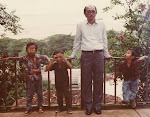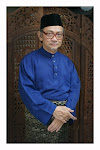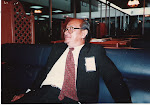Sunday, December 21, 2008
JOURNALIST
Shoes Insult: What's Lost in Translation?
By Fahad Faruqui
Writer and TV Presenter
After what happened in the press conference in Baghdad on December 14, a crash-course in Middle Eastern Languages and Culture Studies should be made mandatory for all senior officials in the White House—especially if they have to travel to the Middle East.
However, most courses that I know of are not geared towards analytical skills that may help a student decipher blatant insults, like what does it mean to be pelted with shoes in the Arab culture? Or, on the other hand, what does it mean to be showered with rose-petals?
Culture of Insults?
Defacing a business card is considered a personal insult in Japan, and the etiquettes of presenting a visiting card is engraved on stone: use both hands to hold the top corners of the card and present it politely with the Japanese inscription facing the recipient. Moreover, the more senior the person, the deeper you bow.
If you plan to go out eating in China, make sure that you do not leave the chopsticks standing upwards in a bowl of rice. Why? It mimics one of their funeral rites.
There are, indeed, some Arab-centric shoe insults, like not sitting cross-legged with the sole of a shoe facing another person, especially the elders. Taking-off shoes before entering the sacred space of a mosque is a must, so much so, that people who point their feet towards the Ka`bah are strongly advised not to, because it is considered disrespectful. What was done by the TV journalist, Muntazer Al-Zaidi, was not so Arab-centric that it is hard for President George W. Bush to understand.
Edward Said's Stone
Several years ago, Edward W. Said, a scholar of great intellect and courage, threw a stone across the Lebanon-Israel border, in celebration of the Israeli withdrawal from the area. As absurd as it may sound, to him it was a "harmless act of joy." Al-Zaidi is no intellectual, and those who showered shoes at the former foreign minister of Egypt, Ahmed Maher, at Al-Aqsa mosque, after the meeting with senior Israeli officials, were all militant Islamists, but Said had the power of the pen.
Said authored several books and published enumerable articles, on subjects ranging from music to the question of Palestine. Why did a man of his stature throw a stone in an empty space? More importantly, what did he aim to accomplish? Like what Al-Zaidi feels for his homeland, Said was exceedingly passionate for the Palestinian cause. Anger—even rightful anger—manifests in irrational ways.
Symbolic Act
Many people have failed to give Mr. Bush his due credit. In all fairness, he has shown the ability to remain calm and collected in most of the crisis situations of his presidency, and his reaction towards the spectacle conducted by Al-Zaidi is by no means out of character.
Anyone who believes that Mr Bush was lost in translation, and hence, misinterpreted the cultural significance of being heckled with shoes has underestimated his ability to gulp down bitterness.
Mr. Bush showed his mastery over his nerves on September 11, 2001, when he sat expressionless among second-graders, after hearing the news of the second plane hitting the World Trade Center, and the repeat performance of his complete numbness in Iraq was superb—a true prodigy of Machiavelli.
Al-Zaidi’s symbolic act of defiance is the result of the warmongering that has shattered Iraq throughout the past seven years.
The Psyche of "Clash of Civilizations"
The Iraqi invasion was premised on a serious and imminent threat: "We know that Saddam Hussein is determined to retain his weapons of mass destruction; he is determined to make more. Given Saddam Hussein's history of aggression, given what we know of his terrorist associations and given his determination to exact revenge on those who oppose him, should we take the risk that he will not some day use these weapons at a time and place and in the manner of his choosing when the world is in a much weaker position to respond?", asked the Secretary of State, Colin Powell, to the United Nations Security Council on February 5, 2003.
Weapons of mass destruction diminished in the stratosphere by virtue of the absurd. Possibly, Saddam Hussein whispered ‘abracadabra’ and the weapons disappeared. The question then is: why could he not cast a spell on himself that could help him vanish and save him from walking up to the gallows on the first day of Eid-ul-Adha?
The vulnerable "Clash of Civilizations" psyche that has prevailed in the White House for the past eight years has undoubtedly worked to orphan countless Iraqi children and widow innumerable women.
You Reap What You Sow
Therefore, anyone who considers Al-Zaidi en par with Oddjob, the henchmen in the James Bond movie, Goldfinger, or Random Task, as in Austin Powers, who threw a shoe at him, is skirting around the issue that is embedded in his clear and succinct messages: "This is a farewell kiss from the Iraqi people, you dog," and "This is for the widows and orphans and all those who were killed in Iraq."
In other words, al-Zaidi has exclaimed that you reap what you sow, but in his own distinct manner.
Fahad Faruqui is a freelance writer—a regular contributor to IOL—who has written on a wide variety of subjects ranging from opera and theater reviews to pressing issues on international politics and human rights. He has, also, anchored a talk-show on a premier Pakistani channel during the Election 2008 in Pakistan. Faruqui read philosophy of religion at Columbia University and later returned to Columbia's Graduate School of Journalism for M.S. He can be reached via mff11@columbia.edu.
(This artical from Islamic On line 21 Disember 2008)
By Fahad Faruqui
Writer and TV Presenter
After what happened in the press conference in Baghdad on December 14, a crash-course in Middle Eastern Languages and Culture Studies should be made mandatory for all senior officials in the White House—especially if they have to travel to the Middle East.
However, most courses that I know of are not geared towards analytical skills that may help a student decipher blatant insults, like what does it mean to be pelted with shoes in the Arab culture? Or, on the other hand, what does it mean to be showered with rose-petals?
Culture of Insults?
Defacing a business card is considered a personal insult in Japan, and the etiquettes of presenting a visiting card is engraved on stone: use both hands to hold the top corners of the card and present it politely with the Japanese inscription facing the recipient. Moreover, the more senior the person, the deeper you bow.
If you plan to go out eating in China, make sure that you do not leave the chopsticks standing upwards in a bowl of rice. Why? It mimics one of their funeral rites.
There are, indeed, some Arab-centric shoe insults, like not sitting cross-legged with the sole of a shoe facing another person, especially the elders. Taking-off shoes before entering the sacred space of a mosque is a must, so much so, that people who point their feet towards the Ka`bah are strongly advised not to, because it is considered disrespectful. What was done by the TV journalist, Muntazer Al-Zaidi, was not so Arab-centric that it is hard for President George W. Bush to understand.
Edward Said's Stone
Several years ago, Edward W. Said, a scholar of great intellect and courage, threw a stone across the Lebanon-Israel border, in celebration of the Israeli withdrawal from the area. As absurd as it may sound, to him it was a "harmless act of joy." Al-Zaidi is no intellectual, and those who showered shoes at the former foreign minister of Egypt, Ahmed Maher, at Al-Aqsa mosque, after the meeting with senior Israeli officials, were all militant Islamists, but Said had the power of the pen.
Said authored several books and published enumerable articles, on subjects ranging from music to the question of Palestine. Why did a man of his stature throw a stone in an empty space? More importantly, what did he aim to accomplish? Like what Al-Zaidi feels for his homeland, Said was exceedingly passionate for the Palestinian cause. Anger—even rightful anger—manifests in irrational ways.
Symbolic Act
Many people have failed to give Mr. Bush his due credit. In all fairness, he has shown the ability to remain calm and collected in most of the crisis situations of his presidency, and his reaction towards the spectacle conducted by Al-Zaidi is by no means out of character.
Anyone who believes that Mr Bush was lost in translation, and hence, misinterpreted the cultural significance of being heckled with shoes has underestimated his ability to gulp down bitterness.
Mr. Bush showed his mastery over his nerves on September 11, 2001, when he sat expressionless among second-graders, after hearing the news of the second plane hitting the World Trade Center, and the repeat performance of his complete numbness in Iraq was superb—a true prodigy of Machiavelli.
Al-Zaidi’s symbolic act of defiance is the result of the warmongering that has shattered Iraq throughout the past seven years.
The Psyche of "Clash of Civilizations"
The Iraqi invasion was premised on a serious and imminent threat: "We know that Saddam Hussein is determined to retain his weapons of mass destruction; he is determined to make more. Given Saddam Hussein's history of aggression, given what we know of his terrorist associations and given his determination to exact revenge on those who oppose him, should we take the risk that he will not some day use these weapons at a time and place and in the manner of his choosing when the world is in a much weaker position to respond?", asked the Secretary of State, Colin Powell, to the United Nations Security Council on February 5, 2003.
Weapons of mass destruction diminished in the stratosphere by virtue of the absurd. Possibly, Saddam Hussein whispered ‘abracadabra’ and the weapons disappeared. The question then is: why could he not cast a spell on himself that could help him vanish and save him from walking up to the gallows on the first day of Eid-ul-Adha?
The vulnerable "Clash of Civilizations" psyche that has prevailed in the White House for the past eight years has undoubtedly worked to orphan countless Iraqi children and widow innumerable women.
You Reap What You Sow
Therefore, anyone who considers Al-Zaidi en par with Oddjob, the henchmen in the James Bond movie, Goldfinger, or Random Task, as in Austin Powers, who threw a shoe at him, is skirting around the issue that is embedded in his clear and succinct messages: "This is a farewell kiss from the Iraqi people, you dog," and "This is for the widows and orphans and all those who were killed in Iraq."
In other words, al-Zaidi has exclaimed that you reap what you sow, but in his own distinct manner.
Fahad Faruqui is a freelance writer—a regular contributor to IOL—who has written on a wide variety of subjects ranging from opera and theater reviews to pressing issues on international politics and human rights. He has, also, anchored a talk-show on a premier Pakistani channel during the Election 2008 in Pakistan. Faruqui read philosophy of religion at Columbia University and later returned to Columbia's Graduate School of Journalism for M.S. He can be reached via mff11@columbia.edu.
(This artical from Islamic On line 21 Disember 2008)
Subscribe to:
Post Comments (Atom)











.jpg)



.jpg)





.jpg)
.jpg)
.jpg)
.jpg)
.jpg)
.jpg)
.jpg)










































No comments:
Post a Comment